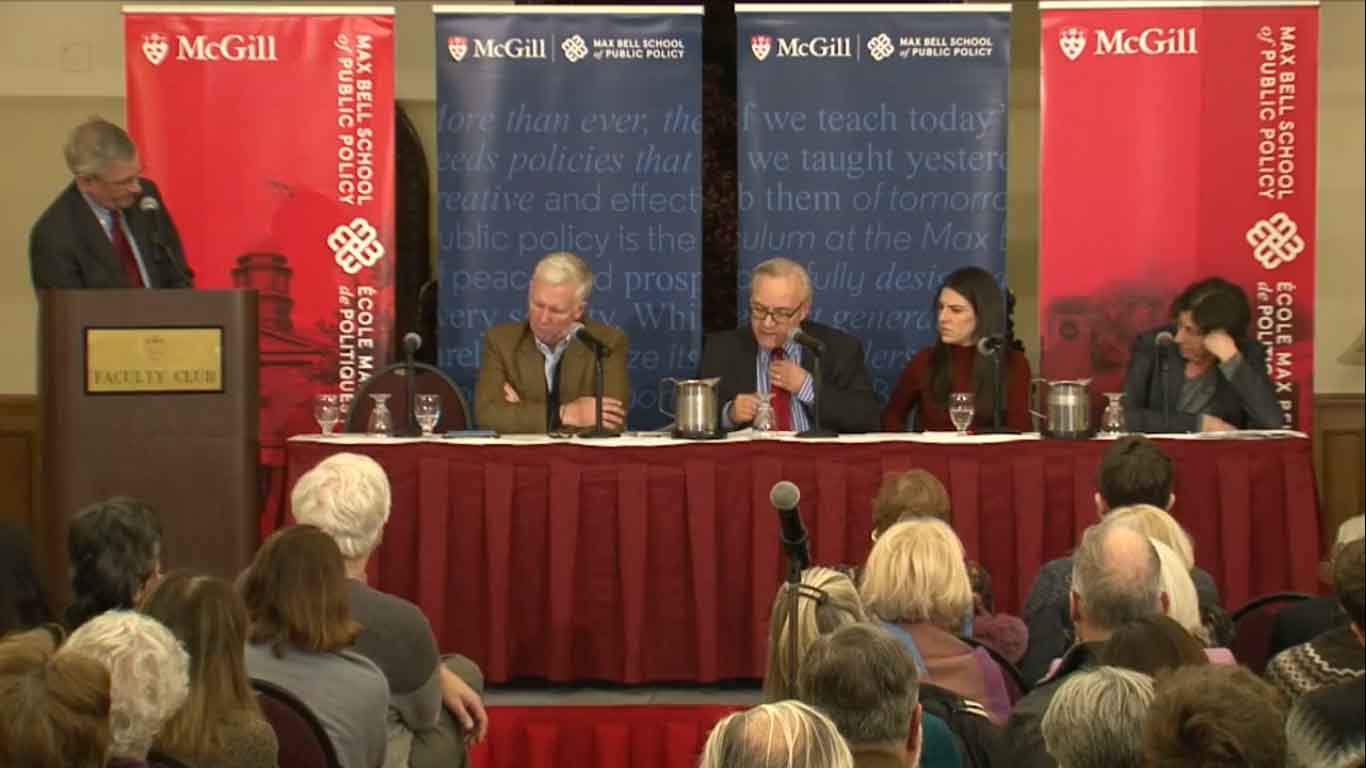McGill’s new Max Bell School of Public Policy hosted a panel discussion on Feb. 5 titled “Does Rising Populism Threaten Good Public Policy?” According to its panellists, the answer is yes.
The sold-out event took place in the Faculty Club ballroom with Pittsburgh Post-Gazette Executive Editor and Pulitzer-Prize-winner David Shribman moderating. The panellists offered a range of perspectives from Canada and the U.S.: Veteran journalist Chantal Hébert and Abacus Data Chairman Bruce Anderson analyzed the Canadian political landscape while Washington Post columnist E.J. Dionne Jr. and Politico reporter Eliana Johnson answered questions about Capitol Hill.
The event began with an introduction from McGill Department of Economics Associate Professor and Max Bell Director Christopher Ragan, who offered a definition of populism.
“The subject of this evening is populism, what it is, where it comes from, and why it matters,” Ragan said. “[Populism is defined as] a political approach that is focused on ordinary citizens and [their] concerns, especially when there is a perception that the elites aren’t taking them seriously.”
Anderson, the first panellist to speak, was skeptical about populism being a major force in Canadian politics, citing non-committed voters as a more significant part of Doug Ford’s 2018 Ontario election victory.
“If we’re doing populism, I think we’re doing it badly,” Anderson said. “Every once in a while, we do see situations where a politician who kind of challenges the man is victorious, but, for most of those situations, you can see another possible outcome [….The 2018 Ontario election] could have gone to the [New Democratic Party].”
Hébert offered a contrasting view on populism in Canada, arguing that political influencers have lost touch with the average citizens’ priorities.
“Populism runs high when something is broken, and I think [it] is a symptom of a broken political conversation,” Hébert said. “And one that we are, those of us who are the so-called ‘chattering class,’ responsible for.”
Hébert described how this disconnect has shifted public perceptions of expert opinions.
“It used to be that when politicians were […] handling crises, what they would do to [seem] on top of things would be to call what I call ‘whitecoats’ to the rescue, people who were experts in their fields,” Hébert said. “Today, […politicians] make their point by proving that they are against whitecoats: ‘Those experts want to tell you this, but we know better.’ ”
According to Anderson, poll results give conflicting evidence for this phenomenon, which he dubs the “reversal of the white coat advantage.:”
“77 per cent [of respondents] say elites have too much power in Canada, but 69 per cent say ‘I like to listen to experts before I make up my mind,’” Anderson said.
According to Anderson, the best explanation for the success of politicians like Doug Ford and Alberta United Conservative Party leader Jason Kenney is not anti-elitism but anger and a lack of political knowledge.
“It’s shocking how many times I ask people in polls […] about contemporary policy discussions […and receive] reflexive and emotional responses, rather than considered, rational, thoughtful ones,” Anderson said.
While he conceded that economic anxieties make populist movements more appealing, Anderson argued that voters still have a responsibility to be informed.
“What are people doing with their anxiety?” Anderson said. “Are they learning more about the issues? Are they studying what the choices are? Or are they hearing somebody say, ‘I think we should put tariffs on everything because tariff wars are easy to win?’ It’s not very sensible policy, but people are gravitating toward [protectionist policy] because it sounds simple, it is reflexive, [and] it is emotional.”
Anderson emphasized the importance of compromise in a healthy political culture.
“We’ve lost the belief in the value of compromise […as a way to] settle our differences,” Anderson said. “I’d like to see politicians champion that idea a little more.”








